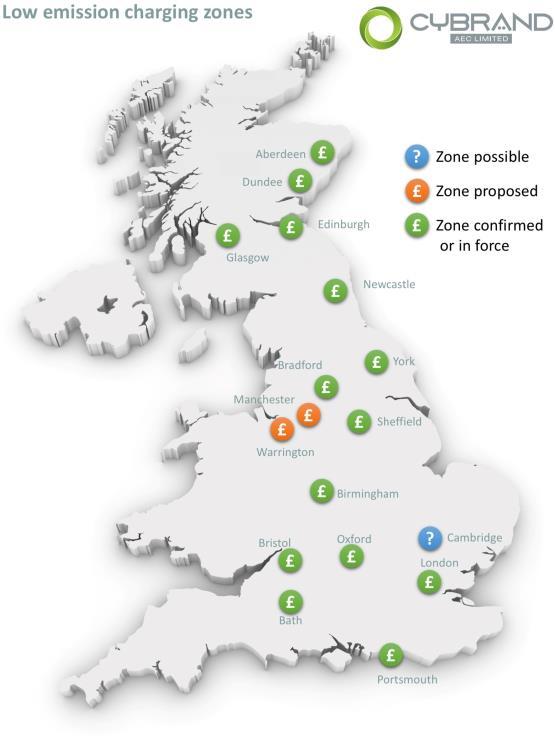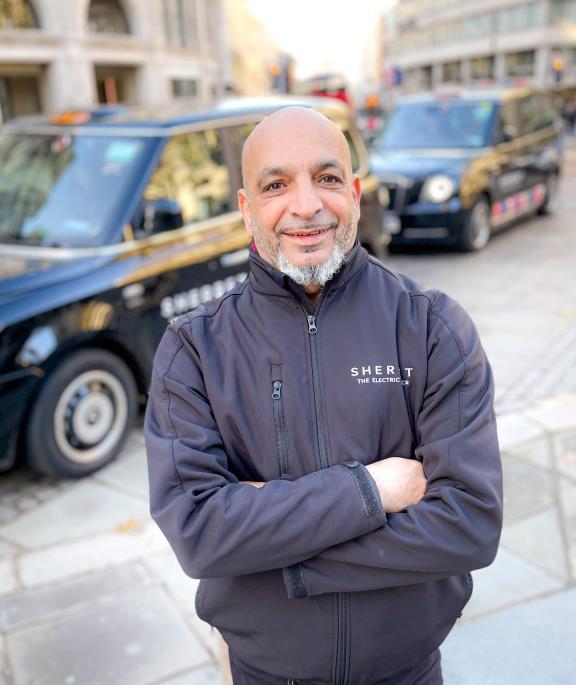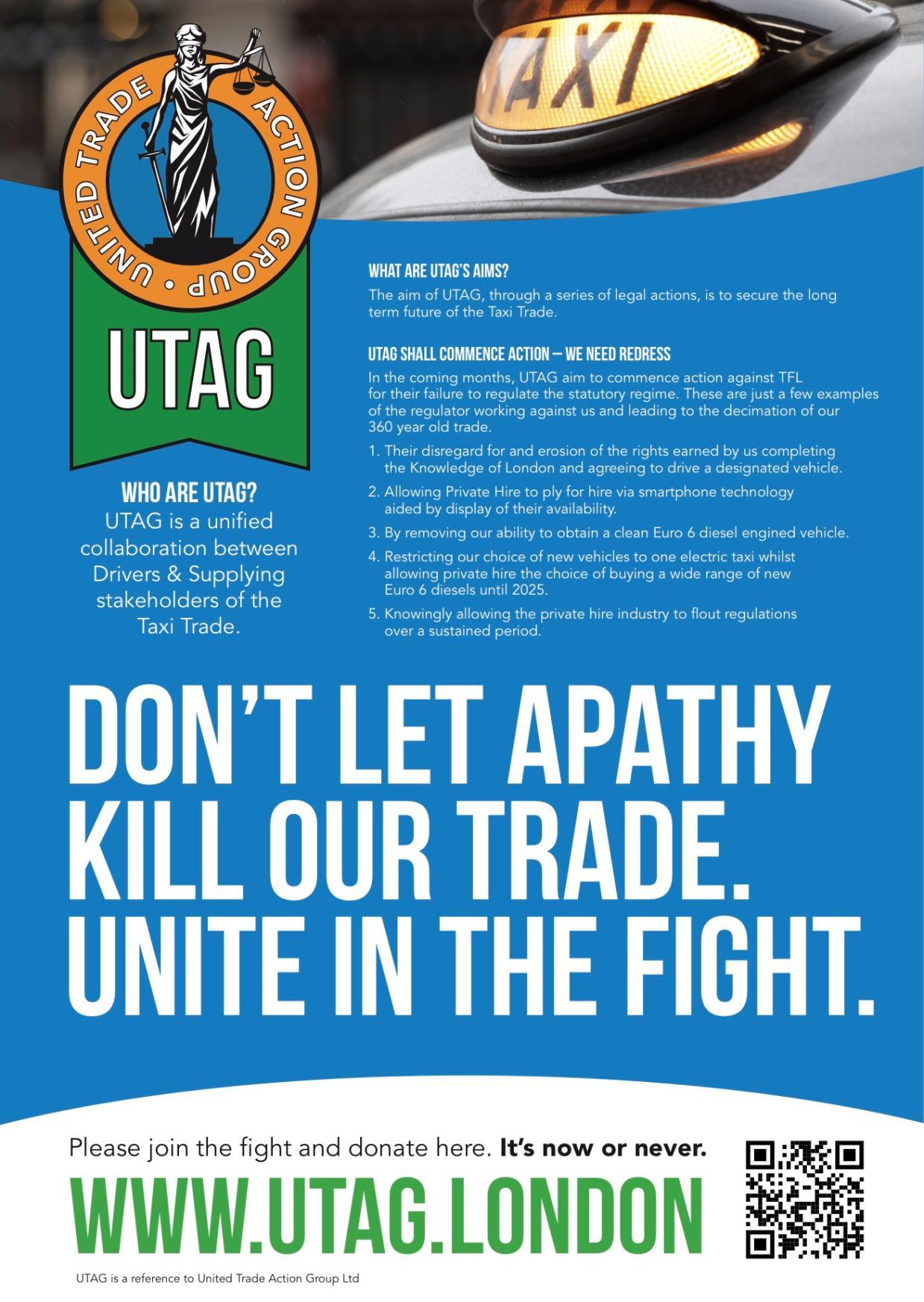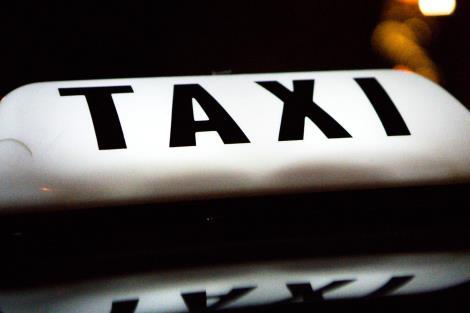

1 FEBRUARY 2023 - Edition 46 TheUK’s#1TaxiNewsSource Edition 46 | FEBRUARY 2023 OVER4millionmagazinereadsandcounting... Imagecredit:LEVC
TaxiPoint Chief Editor:
Perry Richardson
TaxiPoint Publishing & Advertising Manager:
Lindsey Richardson
Visit us online at: www.taxi-point.co.uk

Write to us at: contact@taxi-point.co.uk

Advertising enquiries at: advertising@taxi-point.co.uk
The publishers reserve the right to refuse, withdraw, amend or otherwise deal with all advertisements without explanation. All advertisers must comply with the British Code of Advertising practice.
The views expressed in this publication are not necessarily those of the publishers.
All written and image rights are reserved by the author as displayed. Reproduction in whole or in part without prior permission from the publisher is strictly prohibited.


Copyright brand TaxiPoint 2023. Creative Common image licenses displayed where applicable.
Hello and welcome to TaxiPoint’s second edition of the year.
It’s been a slow start to 2023, with not much ‘big’ happening in the world of taxis. After the last few years, maybe the little break is welcome.
That said, the industry should be hearing back on a couple of hugely important decisions that could help shape the future of the sector.
The results of the Sefton Council v Uber court case held before Christmas 2022 are due any second now and are likely to spark a flurry of activity. Just before this magazine release, the ‘future of the taxi industry’ was also raised as a topic in the House of Commons, highlighting

the precarious position the trade finds itself in some regions.
On a different note, I’d like to say thank you to everyone that got in contact and contributed to this edition. A big thank you the Sherbet’s Asher Moses who has committed to a monthly column on TaxiPoint. It’s great to hear from real innovators and leaders within the trade. If you fancy a place in TaxiPoint please do contact us directly.
We hope you enjoy this month’s offering and be lucky,
TaxiPoint Editor and Founder
2 FEBRUARY 2023 - Edition 46 EDITORIAL
2023 sees more UK cities planning the introduction of Clean Air Zones (CAZ). Private motorists will be required to pay a charge if they fancy a visit into any of the given city centres, but for taxi drivers and workers who travel in most days they have caused a financial headache for many so soon after the pandemic.
Drivers in London already face charges if they wish to enter the capital’s low and ultra-low emission zones (ULEZ). Five other English cities have already introduced clean air zones with at least three more due to start in the coming weeks and months.
Currently, drivers in Bath, Birmingham, Bradford, Bristol and Portsmouth all face potential charges based on the level of their emissions.
Tyneside has most recently introduced their CAZ on 30 January and Sheffield will soon follow suit on 27 February.
Greater Manchester is the third local authority set to introduce a clean air zone in 2023 although they have yet to agree on a date.

In Scotland there are four confirmed CAZ in operation or incoming soon; Glasgow, Edinburgh, Dundee and Aberdeen.
HOW DO THEY AFFECT TAXI DRIVERS?
It all depends on the CAZ and where the taxi is licensed. For example, all London taxis are exempt from paying the ULEZ charge, but strict new ZeroEmission Capable (ZEC) vehicle rules were agreed which will phase diesel black cabs out by 2030.
In other cities, taxi drivers will be made to pay the charge if their vehicles fall outside of acceptable emission levels.
3 FEBRUARY 2023 - Edition 46 FEATURE
GOTANOPINION?Emailcontact@taxi-point.co.uk
In Sheffield’s version, private cars and motorbikes will not be charged. However, heavy goods vehicles (HGVs), light goods vehicles (LGVs), vans, buses, coaches and taxis will be.
Hackney carriages licensed with Sheffield City Council will be given until 5 June 2023 before facing a charge of £10 per day to enter the city centre. A cabbie working 5 days a week for 45 weeks of the year will need to fork out a whopping £2,250 or invest in a new compliant cab during a cost-of-living crisis.
Aside from buying a new ZEC taxi, retrofitting existing cabs to meet Euro 6 compliance standards is seen as one way of future proofing a driver’s taxi. Using a fully approved retrofit conversion could not only save money on fees, but it will also ensure that the taxi is less harmful to the environment.
TX4 taxi owners have been waiting patiently for the kit to become available in London and other cities, after seeing the retrofit approved in other major UK cities like Birmingham and Glasgow.

The conversion is also available for Euro 5 Mercedes Vito and Peugeot E7 taxis. The price of the conversion
starts at around £6,000 plus installation/extras and VAT. Some cities implementing CAZ are still offering grants available through local government, meaning the cost of the conversion can be considerably slashed.

The accreditation required to become exempt from
Aside from buying a new ZeroEmission Capable (ZEC) taxi, retrofitting existing cabs to meet Euro 6 compliance standards is seen as one way of future proofing a driver’s taxi…
4 FEBRUARY 2023 - Edition 46 FEATURE
GOTANOPINION?Emailcontact@taxi-point.co.uk
emission zone fees within the LEZ or CAZ is known as Clean Vehicle Retrofit Accreditation Scheme (CVRAS) and is administered by the Energy Saving Trust.

TAXILICENSING
ARE CHEAPER LICENSING FEES A GOOD THING FOR DRIVERS AND PASSENGERS?

By scaling up and making licensing a nationwide business, CWC have no doubt streamlined the process and reduced some costs through bulk processing. However, it can also be argued that the council have whittled licensing driver requirements down to the bare bones to reduce those costs too.
Should it be seen as a positive move that Blackpool have chosen to reduce its standards by scrapping a related vocational qualification (RVQ) to remain competitive with a council over 100 miles away?
For drivers looking to work in the region they are licensed in there is unlikely to be any long-term financial savings. Costs will be closely linked to the tariffs offered up to customers. Higher costs, higher prices. Lower costs, lower prices.
However, if the majority of drivers are seen as cheaply licensed ‘out-of-towners’ it gives the operator a choice to further squeeze the price to a level set by the bargain basement licensing fees. The big dilemma facing councils like Blackpool is that there is little point in raising standards in their region if others with lower standards can work side-by-side their drivers.
In life you usually get what you pay for. Removing elements of training from any sector of employment is likely to mean less skilled workers, higher churn rate, and tougher recruitment long term as the pool of people runs dry.
It’ll be interesting to see just how low some authorities are prepared to go in 2023.
ARTICLE BY: PERRY RICHARDSON TAXIPOINT FOUNDER AND EDITOR

Hello and welcome to my first TaxiPoint column. I hope you’ll park up and join me here every month, where I’ll be exploring what’s happening in our trade, shining a light on the good news and celebrating all the positives that come from being proud black taxi drivers.

I’ve seen a lot of change in our industry over more than three decades, having passed The Knowledge way back in 1989. The last few years have been beyond tough, but I am confident that we’re now out the other side - and in a position to lead and succeed. However, this year will still be critical for us with the continued cost of living crisis and worries about the recession. Taxi demand in the UK is currently buoyant but certainly here in London, the number of licensed drivers is still down 20% compared to pre-pandemic levels. It’s also proving hard to attract new drivers into the business, with high vehicle and operating costs adding another barrier on top of the expense and commitment of The Knowledge.
The fact remains we need to future-proof the industry if we want to continue growing and ensure the customers keep coming.
As we start 2023, the first step towards that is to keep pushing for our industry to be appreciated for what it is, an innovative and constantly developing sector - we’re a UK institution after all. We also need to keep pushing for more black-taxi friendly infrastructure as a fundamental part of British life. And on my part, I want to use this column to help our industry better understand our overall value and unique selling points.
The second step is we must all embrace new tech if we’re going to continue connecting to customers who seek our services and are happy to pay the right fee.
And finally, we need to keep abreast of all the latest facts and information so that you are in the best place to plan your business amidst rising interest rates and economic instability, which is something I also intend to help with in this column. I hope you’ll join me for the ride…

FEBRUARY 2023 - Edition 46 EXCLUSIVENEWCOLUMN Emailcontact@taxi-point.co.uk AREYOUOURNEXTQ&APARTICIPANT?
Imagecredit:SHERBET

The sight of dozens of black taxis lining London’s Mall last September on the day Queen Elizabeth II died was a moving and striking tribute to her Majesty. The impromptu guard of honour made headlines around the world and embodied everything black taxis stand for – a true symbol of British national pride. In London alone, there are around 20,000 and they need no advert to get noticed. All eyes will be on the capital and our black taxis when Brand Britain comes into the spotlight again at King Charles III’s coronation on 6 May.
The black taxi is a global icon and a UK tourist attraction and institution in itself, along with Big Ben, red telephone boxes and the Great British pub. Everyone loves a British black taxi - even celebrities including Kate Moss, Stephen Fry, Arnold Schwarzenegger and Happy Mondays legend Bez love them so much they own their own for personal use. There are popular black taxi guided tour companies across the country too, from Belfast to Manchester to Edinburgh.
The black taxi is a British emblem and the London taxi market in particular is revered around the world, and rightly so, considering the quality and functionality of the vehicles and the professionalism and training of the drivers.
The black taxi is admired so much that when Azerbaijan hosted the Eurovision Song Contest a decade ago, British contestants and fans flocking to the capital Baku
felt completely at home, as the government had just bought a fleet of more than 1,000 just ahead of the competition in a bid to help boost its transport infrastructure.

The Azeri aren’t alone - the UK now sells London black taxis to 20 countries around the world, including Bahrain, Saudi Arabia, Italy and France, and they could soon be bustling along the streets of Jerusalem if the upgrades for the UK’s Free Trade Agreement between Britain and Israel comes to pass this year as hoped, as the government there is keen to buy LEVC’s iconic electric black cabs.
It will only enhance and further emphasise just how great our British black taxis are in 2023 - we have a lot to look forward to!
18 FEBRUARY 2023 - Edition 46 ASHERMOSESCOLUMN Emailcontact@taxi-point.co.uk AREYOUOURNEXTQ&APARTICIPANT?
Imagecredit:SHERBET
What did you do before you became a black taxi driver?


I have spent most of my adult life working in the children and young people sector covering a host of roles along the way including learning facilitator, mentor and senior youth worker but my last job within this sector was working as a youth football coach.
What attracted you to the profession?
The idea of being my own boss and being able to have full control over my time was the main attraction.
How long did it take you to pass The Knowledge and when did you pass?
The Knowledge took me just under four years to finish but in all honesty, if I had applied myself a bit better during the studying of the blue book I would have finished it a lot quicker. I received my green badge on 4 November 2022.





What was the most difficult thing about learning it?
It task. It comes with many challenges that will test a person along the way. For me, some of the most challenging moments included going out on my bike in the winter when it would be freezing cold and wet. It took a lot of mental strength and discipline to go out on those days. Post Covid lockdown also brought about a significant change to the road layout of London, I had to relearn everything and it was incredibly frustrating.
ASHERINTERVIEWS Emailcontact@taxi-point.co.uk AREYOUOURNEXTQ&APARTICIPANT?
GILROY FORDE NEW LONDON TAXI DRIVER Q&A Imagecredit:SHERBET
What kind of area/borough/town/city are you mostly working in?



As I live in West London I mainly work the Kensington, Knightsbridge, Mayfair, Chelsea and Notting Hill.
What is the best bit about the job so far?
Being able to start and stop work whenever you want!
Any pet peeves so far?
Constant roadworks and closures to key roads. Traffic is obviously a part of the job but when important roads are constantly being closed for less than important reasons, this can make the job frustrating at times.
Who would be your dream passenger?
Being a huge football and music fan, Brazilian Ronaldo (R9) and Dame Dash the ex-CEO of Rocafella records would be amazing. I would love to chat with these two about their experiences within their respective industries.
Most interesting/best fare to date?
My best fare was a £150 trip to Gatwick but the most interesting fare was having my taxi (and myself) used as a prop in the filming of an upcoming Tollywood version of Sherlock Holmes. It was really interesting to see how the production worked and to drive around Baker Street soaking it all in.
What thoughts do you have on the future of black Taxis?
Statistics say that fewer people are doing The Knowledge so the numbers don’t reflect well for the trade.
I do believe there is a future if the way it is advertised was addressed. Most young people don’t know about The Knowledge and the benefits of being a London cabbie. If the industry found a way of advertising to a younger demographic then I definitely feel there would be more applicants.

ASHERINTERVIEWS Emailcontact@taxi-point.co.uk AREYOUOURNEXTQ&APARTICIPANT?

The taxi industry continues to stall in attracting new taxi drivers into the trade throughout the UK.
Some councils have tinkered with the licensing fees, dropping them by £50 over a three-year period, and some have reduced previous standards to entice more drivers in. The truth of the matter is that these small changes will not have any effect on potential applicants joining the industry.
There are two main variables that will attract new drivers and they are the tariffs set and the vehicle costs imposed.
TARIFFS
If you’re setting up a business in any sector you want to know how you’re going to create revenue. When it comes to a taxi licence, revenue is regulated and set to a maximum limit using a taximeter. If that taximeter hasn’t been amended in the last 12-24 months, it’s more than likely inflation and trading costs have overtaken the going rate and the job isn’t worth considering. Simple as that.

Annual reviews should be implemented across all licensing authorities just like other public transport
reviews to keep drivers in the sector and to entice more in.
AGE LIMITS
Any applicant looking to start a career in the taxi industry is going to look at the costs involved in setting up business. The vehicle will always be the biggest expenditure and right now the big numbers involved can put many people off entering the trade.

Now there’s only one purpose-built taxi available to buy. There is no option to lower costs by purchasing a cheaper model. Second-hand taxi prices are also peaking due to demand for vehicles.
The cost of a taxi isn’t going to drop. Inflation and high interest on finance has seen the price of a taxi escalate to well over £90,000 and sometimes knocks on the door of £100,000 depending on the size of the deposit.
The cost of a taxi is more than likely to rise again as inflation continues. There’s even the looming threat of the Plug-in Taxi Grant (PiTG), worth £7,500 to cabbies and fleet owners buying a purpose-built electric taxi, ending in April 2024.
SPECIALISEONATAXITOPIC?Thiscouldbeyourplatform. Email:contact@taxi-point.co.uk
However not all is lost if licensing authorities EXTEND the lifetime of greener taxis.
Using London as an example, the LEVC TX can only work in the capital for a total of 15 years. A cabbie registering a new taxi would therefore see the investment made on a taxi over those 15 years valued at around £6,500 each year.
If the limit was increased to 20 years that would drop significantly by £1,500 each year of licensing. An applicant making a long-term career decision would save £30,000 over the course of 20 years. That would be much more appealing than the £50 saved on licensing fees over a three-year period.

Obviously if age restrictions were to be increased, the standards must be maintained. More regulator checks for older taxis could and should be an option. However, there is no reason why modern-day taxis cannot meet future required standards set.
THE GREEN ARGUMENT
Zero-emission capable taxis are here. You cannot get greener than zero. The only shift in regulation that
might come is that all taxis will be required to become fully electric or zero-emissions at some point. That shouldn’t however be the argument to impose age limits. Retrofits are seeing diesel TX4s become fully electric, and technology will surely advance to allow the current LEVC TX and other plug-ins to retrofit to fully electric when required.
Extending the age limits on greener taxis will also help the environment. A green taxi is never greener than when its transporting communities around on zeroemission capability. However, before they are licensed that is certainly not the case.
The manufacturing of electric car batteries and the vehicles themselves are high. Scrapping a perfectly good vehicle that meets all the required standards after 15-years to churn out a new one at a high cost to the environment cannot be the right message for authorities looking at carbon neutrality?
The taxi age limit holds the key to the future of the UK taxi industry.


Imagecredit:LEVC
TAXIVEHICLES
A buoyant second-hand electric taxi market in London grows, but high demand could stall the electric revolution plans outside of the capital as a result.
The first purpose built electric taxis manufactured by LEVC rolled off the conveyer belt in January 2018. Most of the TX taxis driven out of Coventry’s LEVC Ansty plant made their way to London.
Since 2018 over 6,600 zero emission capable (ZEC) have been licensed, making the capital the fastest city in the UK to adapt to the new technology.
Five-years on and as PCP leasing deals expire, a growing number of vehicles are now making up a new second hand taxi market.
Historically many of the older London taxis would find their way outside of the M25 to carry on their working life as a licensed taxi. However, high demand for second-hand electric cabs could stall the natural nationwide eco-system for cabs.

For drivers and fleet owners who took the plunge early, the unit price of a LEVC TX was £55,000. Five
years on and dealers are selling 2018 models for between £40,000-£42,000. That represents just a £15,000 depreciation in value over fourfive years.
Yes of course dealers will pay less for a vehicle on part-exchange or at trade price, but the taxis are way above the balloon payment values for those that were bought in 2018. Many balloon payments sit at around the £17,000 based on a low initial deposit.
WHAT IS DRIVING THE HIGH SECOND-HAND VALUES?
Confidence in electric vehicles (EV) has grown since drivers first purchased the cab. Many have seen lower fuel costs, reduced maintenance bills and better reliability compared against diesel taxi counterparts. Inflation has pushed the unit price of a new LEVC TX up to record high levels. Interest rates have also pushed the overall cost of a new vehicle up to over £90,000 in some cases depending on the deposit put down.
Extended warranties are swaying some drivers to keep their cabs freehold or by refinancing the balloon payment required.
There is also a huge demand from London rental firms for second-hand cabs which is in turn pushing up trade price. Deals offering to pay owners ‘silly money’ for cabs are circulating on a daily basis as fleet owners look to purchase enough cabs to satisfy their own growing demand from drivers.
Until the capital is ready to let go of more financially viable taxis, some UK cities will continue to struggle shifting to greener taxis.
25 FEBRUARY 2023 - Edition 46 TAXIVEHICLES
Taxi companies have seen drastic changes over the past decade. Not only have ridehailing services proven big competition, but consumer behaviour has changed, too. In fact, a study by Statista shows that by 2026, 53% of total revenue across the taxi and ride -hailing industry will come from online sales a big shift for a once-offline industry.
While there might be challenges ahead for taxi firms, the way the industry has evolved presents several opportunities. Statista expects the taxi and ride-hailing industry to show an annual growth rate of 7.51% this would result in a projected market volume of $369.30bn by 2026.

To capitalise on this, taxi companies should look for ways to increase utilisation and make the most of their existing assets.
In fact, this is one of the biggest advantages a traditional taxi company has over a ride-hailing app; being asset-heavy means they can leverage economies of scale.
Here are 3 major opportunities that taxi operators should take advantage of in order to position themselves as a strategic player in the evolving mobility landscape:
RIDE-HAILING APPS CAN FUNCTION AS ANOTHER SOURCE OF DEMAND
Many taxi firms might see ridehailing companies as the competition to beat, but there’s an incredible opportunity to form mutually beneficial partnerships. While ride-hailing companies have seen significant growth in the past decade, they don’t have the same economies
FEBRUARY 2023 - Edition 46 TAXIDISPATCH
of scale as taxi firms, as they don’t own the vehicles and find it challenging to increase profit margins despite their growth in the number of rides. Essentially, every driver is an independent entity paying the same amount for the vehicle costs including maintenance, depreciation, insurance, and gas.
Ride-hailing companies are also facing wider driver shortages, especially in areas where there is increased driver regulation, this means they’re keen to partner with local taxi firms to hold onto key markets.
With ride-hailing companies putting their own money into the promotion of their apps, taxi companies benefit from increased demand without the need to increase marketing dollars. In other words, taxi companies can begin to bring in customers from different sources, adding rides from popular apps on top of those that come through existing methods.
BUT TAXI COMPANIES MUST MAINTAIN OWNERSHIP
While there is a considerable incentive for taxi companies to increase demand with this kind of partnership, there are some critical factors they need to be aware of.
operation centrally. With multiple sources of demand, the taxi operator can optimise the fleet and maintain a high level of efficiency and customer experience.
Use a single driver app: A single taxi company branded driver app that aggregates all sources of demand, creates a significantly better driver experience, increasing driver loyalty and retention. Don’t agree to exclusivity: While ride-hailing companies might insist on exclusivity, taxi firms should avoid this to ensure they can maximize demand from multiple sources that are complementary and allows them to utilise their fleet as much as possible and complete more rides.
OPTIMISATION — SAME FLEET, MORE BUSINESS
While taxi firms could add more drivers and vehicles to potentially increase revenues, fleet optimisation is often a better solution as it improves results by getting more from existing assets. This can be achieved by using the right technology to improve your fleet’s performance.

Here are just 2 examples of optimisation opportunities that have a significant impact on the fleet:
Optimised Ride Dispatching
Centralised dispatching: It’s important for the taxi company to control their own dispatching rather than allowing the ride-hailing companies to dispatch on their side, essentially selling a ride rather than renting out the drivers. This allows the taxi operator to enforce dispatching policies and manage the
Most off-the-shelf taxi dispatch software are based on straight-line distance as the crow flies. This method doesn’t take into account road layout, traffic conditions, special events or other elements (such as one-way streets) that could affect the ETA. With optimised dispatching, the technology looks at all the variables that could affect pickup times and understands that the closest driver by air distance isn’t necessarily the one best placed to take on the ride.
To demonstrate this, let’s take the following scenario: James has just finished a long day at the office and is eager to get home in time to watch the latest episode of House Of The Dragon.
27 FEBRUARY 2023 - Edition 46 TAXIDISPATCH
There are 3 available vehicles in his vicinity, marked by 3 colours red, blue and green.

Which vehicle should we dispatch James’s ride to? Seems obvious that the red vehicle is the one that’s going to get James home in time to watch the show.
rates, increase the efficiency of the fleet and maximize customer satisfaction.
AI-POWERED DEMAND PREDICTION & REBALANCING RECOMMENDATIONS
Another way to optimise your fleet using technology is by predicting future demand.
By leveraging advanced machine learning models, demand can be predicted across different sources such as a mobile app, street hail, call centre and partner channels. Furthermore, the demand is predicted at varying levels of time and geographic granularity, depending on the specific operations.

Using the predicted demand, as well as the availability and location of drivers, personalized route recommendations could be generated and sent to drivers in order to increase the chances of receiving a ride, maximizing driver earnings and reducing customer waiting time.
Take another look, if we distance) and that the red vehicle is headed in the opposite direction, it seems that now the blue vehicle is the one that will be the fastest.


Let’s try that one more time, but this time let’s also consider the traffic conditions. The blue vehicle is in standstill traffic and would take 20 minutes to pick up James, and actually, the green vehicle will be able to allow James enough time to get home and make some popcorn.
Accounting for all these factors in real time makes a big difference to reduce ETAs, improve cancellation
At Autofleet, we have seen over 35% increase in completed rides through rebalancing recommendations and demand prediction.
Technology empowers taxi companies by enabling them to maximize fleet performance. Embracing advanced capabilities such as Optimized Dispatching and Demand Prediction means fleet operators can do more business with the same resources. With cars in the right place at the right time, and being dispatched in the most efficient way, companies are able to increase income without drastically increasing costs. This leads to more profit but also enables better driver and customer experiences.
28 FEBRUARY 2023 - Edition 46
TAXIDISPATCH
Imagecredit:AUTOFLEET
Imagecredit:AUTOFLEET
currently works and smooth out future operational issues.
To see the benefits of an electric fleet, taxi firms must ensure they can maintain their completed rides per day without letting the customer and driver experience slip. One way to do this is through the use of technology. Simulations in particular can help you better understand the needs of your fleet while taking into account both range and charging strategy. Running predictive simulations before you make the switch can help empower decision-making.


Some of the insights include:
• The daily range needed and, therefore, which EVs would be most suitable
• Optimal charging locations

• Impact of charging time on the driver experience (i.e. how much time will be spent waiting for a car to charge)
• How charging and range will affect ETAs
With a simulation, you can understand how things might change and put plans in place to minimise disruption as much as possible. This helps to ensure a smooth transition with positive effects on the business.
FEBRUARY 2023 - Edition 46 TAXIDISPATCH
After three consecutive months of falls, the average price of petrol bottomed out at 148.35p towards the end of January and has now started to slowly rise again, data from RAC Fuel Watch reveals.
Having at one point been as much as 3.5p lower than at the start of the month, unleaded closed January at 148.89p – 3p lower than it began (151.85p). The last time drivers filled up at this price was in mid-February 2022 before Russia invaded Ukraine.
The average price of diesel dropped by 4p from 174.37p to 170.37p – a price last seen in March 2022. This means a tank of diesel now costs £93.70 – £2.20 less than at the beginning of January. A petrol fill-up is now £81.89 – down £1.63 in the month.
Filling up at one of the big four supermarkets was around 3p a litre cheaper for both fuels, with the average price of petrol at their sites finishing January at 145.71p (down 2.25p) and diesel at 167.49p (down 2.79p). Asda had the lowest prices with a litre of unleaded costing 144.61p (down to 2.5p) and diesel 166.09p
RAC fuel spokesman Simon Williams said: Although January saw fuel prices fall for the third month in a row, there is now more cause for concern than celebration as petrol has already begun to creep back up very slightly.”
Same as the last few months when it comes to electric prices. Home charging remains better value than petrol or diesel cabs, but the inflated public charger prices will make drivers think twice about fuel sources if they have the choice between petrol and electric like with a LEVC TX.

FEBRUARY 2023 - Edition 46 TAXIPOINTFUELREPORT

All taxis operating in St Albans District may soon have to mandatorily accept contactless payments and no longer choose to be just cash-only cabs.

The proposed rule is intended to improve public safety by ensuring people are not left stranded because they do not have cash.
It comes in response to a growing number of complaints from people who were unable to get a taxi late at night because they only had a card. Officers from St Albans City and District Council, which licenses taxis within its area, conducted an inspection of taxi activity one night in November last year.
They witnessed a woman at the City’s main rail station being refused a cab four times because she had no cash and could only pay by card. She was faced with a long walk home in the dark before she finally found a taxi that would take her.
Members of the Council’s Licensing and Regulatory Committee unanimously supported the proposal to oblige taxis to be equipped with card machines at its meeting on Tuesday 17 January.
The machines are able to take contactless payments from mobile phone apps such as Apple Pay as well as bank cards.
A four-week consultation will now be held with the final decision on whether to implement the rule being delegated to a senior Council officer.
32 FEBRUARY 2023 - Edition 46
Imagecredit:HMRC GOTNEWS?Emailcontact@taxi-point.co.uk
Councillor Raj Visram, the Committee’s Chair, said after the meeting: “Many of our licensed taxis carry card machines already, but there are some that still choose not to.
“The Committee felt very strongly that we need to bring in this new rule for taxi drivers to accept contactless payments as soon as possible. It is clear we have the public behind us as there has been an increasing number of complaints about cash-only cabs.
Licensed taxis in Bolsover District will now be required to have working CCTV in their vehicles.
Bolsover District Council is rolling out the measures for taxis licensed in this area over a six month period.
The CCTV system aims to provide a safer environment for both the passengers and driver by:
• deterring and preventing the occurrence of crime
“This new rule recognises that we live in a digital age and will also improve public safety by making sure people are not left in a potentially vulnerable situation by not having cash to pay for a taxi home.
• reducing the fear of crime
• assisting the Police in investigating incidents of crime
• assisting insurance companies in investigating motor vehicle accidents.
Bolsover District Council’s Chair of Licensing, Councillor Ray Heffer, said: “We have taken this step to protect both residents and drivers by ensuring taxis have CCTV. If you choose a taxi which is licensed by Bolsover District Council you know you have an extra safety measure within that taxi.
“Our taxi drivers’ representatives were consulted about the proposal and they have accepted the need to move in this direction. It will also be good for their trade as those drivers who choose to be cash only are actually missing a lot of business.”
If the new rule comes into force, drivers unable to take contactless payments will risk losing their licence.

“This step helps up to safeguard our residents and taxi drivers and gives peace of mind to anyone using Bolsover District Council licensed taxis.”
The Department for Transport have issued guidance stating that the use of CCTV can provide a safer environment for the benefit of taxi/private hire vehicle passengers and the Health and Safety Executive list the installation of CCTV with visible signage as a successful measure to improve safety.
33 FEBRUARY 2023 - Edition 46
UKTAXINEWS
“Since we came out of the Covid lockdowns, more people have been using their card or phone to pay for things and are no longer carrying cash.
Gedling Borough Council will be forced to pay back £150,000 to taxi operators licensed in the area after an ‘embarrassing’ error made by the council was uncovered during a review. An internal council review conducted last year prompted a further independent review by the Chartered Institute of Public Finance and Accountancy (CIPFA), which discovered the council was overcharging taxi operators. The review also found it had been undercharging drivers for their licences, which has cost the council more than £430,000.

Councillor Sam Smith, Conservative councillor for Trent Valley, said: “We need a better answer as to why this has been allowed to happen over six years.
“It has taken a taxi driver, that we as an authority licence, to bring this to our attention. That quite frankly is embarrassing.
“We are a service that we offer to those drivers and they should get it at a fair cost.”
According to the Nottingham Post, the council should have separated the accounts for drivers, vehicles and operators. However, members were informed that the council had not historically organised the accounts in this way.
Taxi cabs in Swindon and Exeter now carry lifesaving emergency bandages thanks to Rapaid who have donated and distributed kits across the regions. The recent donations follow successful campaigns in Manchester and Oxford with hundreds of taxi cabs now carrying emergency bandage kits. Each cab displays a Rapaid window sticker that clearly identifies to the public the cab has bandages available for the public in the event of serious trauma or a major incident.

Council officer Mike Hill, told the Licensing Committee: “It shows that the council has undercharged for driver licences between 2016/17 through to 2021/22, by £430,728.
“It has however overcharged for vehicle licences between 2016/17 through to 2021/22 for all but one year, which was 2017/18, in total the overcharge there is £124,186.
“The council has also overcharged for operator licences between the same period 2016/17 through to 2021/22, totalling £12,542.”
The gaffe is likely to cost the council up to £150,000 through refunds and interest paid out.
34 FEBRUARY 2023 - Edition 46 UKREGIONALNEWS
Birmingham City Council have issued a whopping 419 illegal parking tickets to motorists parked up on taxi ranks in December 2022 alone.
The latest haul brings the total number of tickets handed out to a mammoth 2,755 since April 2022.
A BCC Licensing spokesperson said via social media: “419 PCN's issued for illegal parking on Taxi ranks in December 2022, bringing the total since April up to a whopping 2,755.”

Two women were left shaken after unsettling taxi journeys in two separate incidents in East Devon, prompting council warnings.
East Devon District Council’s (EDDC) licensing department has received two reports in the past month from people using taxis taken from a rank on the Strand, in Exmouth.

UKREGIONALNEWS
Teenage volunteer cadets and police officers ‘mystery shopped’ private hire drivers to find NONE responded to 'red flag' behaviour around child sexual exploitation in Leeds. An undercover operation to identify risks around child sexual exploitation in the local hotel and private hire vehicle economy has been run in Leeds.
Officers from Leeds District Safeguarding’s Child Vulnerability and Exploitation Team worked with colleagues from Leeds North West Neighbourhood Policing Team, police cadet volunteers and staff from Leeds City Council Taxi and Private Hire
Licensing to run a ‘test purchase’ style operation targeting hotels and private hire vehicles in outer north-west Leeds.
Watford Borough Council are consulting on proposed changes to taxi fares, following a request from the Watford Hackney Carriage Drivers’ Association to review the current tariff.
If supported, the tariffs could move in line with inflation by 19 percent across all taxi tariffs.

The consultations, which are a statutory requirement, will close on 17 February 2023.
Opinions are being invited from the taxi trade, general public and anybody with an interest in taxis, on the review of the tariff, which has not been revised since 2017.

Cllr Richard Wenham, Chair of the Licensing Committee, said: “The council recognizes the significant impact that the cost of living crisis is having on individuals and families, which prompted us to declare a state of emergency on this issue. However, we also acknowledge that the taxi industry and its drivers are similarly affected by this crisis.
“In response, the taxi trade has formally requested that the council conduct a comprehensive consultation on the taxi tariff. The council is committed to considering the perspectives and feedback of all stakeholders, and as such, we encourage members of the public to voice their opinions. By conducting this consultation, the council will be better equipped to make an informed decision when reviewing the taxi tariff.”
36 FEBRUARY 2023 - Edition 46
UKREGIONALNEWS


















 JAMIE MACKENZIE MANAGING DIRECTOR, UNIFIED TRANSPORT SYSTEMS
JAMIE MACKENZIE MANAGING DIRECTOR, UNIFIED TRANSPORT SYSTEMS




 Imagecredit:RossCampbell
Imagecredit:RossCampbell















































